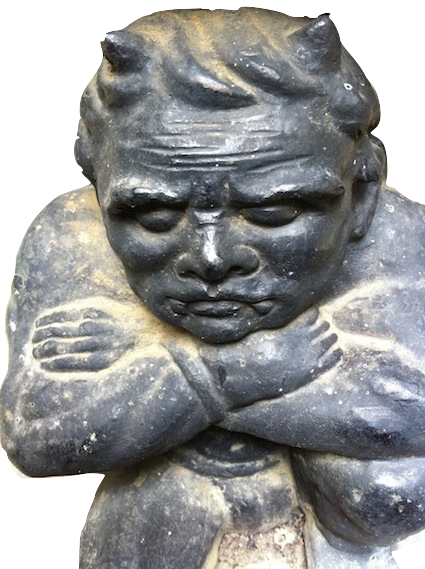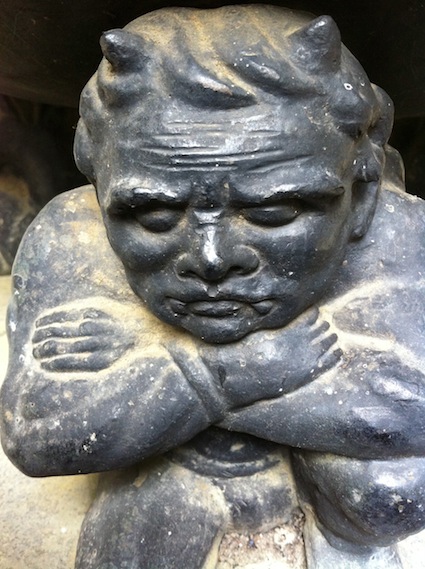「負荷なき自己と「位置ある自己」
unencumbered self v.s. situated self

「負荷なき自己と「位置ある自己」
unencumbered self v.s. situated self

Mitzub'ixi Quq Chi'j
「負荷なき自己 (unencumbered self)」と「位置ある自己(situated self)」は、リベラリズムとコミュニタリアニズムの論争を表現するために、マイケル・サンデルが導出した概念である。どういうことだろうか?そのため には、リベラリズムとコミュニタリアニズムが、お互いに、自分たちの主張のどこに力点をおいているのかを考える必要がある。
| 負荷なき自己 (unencumbered self) |
「負債なき自己」とは、哲学や政治理論、特に
自由主義において、個人が外部の制約や社会的条件から解放され、合理的かつ独立して行動できると想定する概念だ。この考え方は、個人の自律性と、社会的役
割、伝統、既存のアイデンティティに影響されることなく選択を行う能力を重視している。 |
The "unencumbered self" is a
concept in philosophy and political theory, particularly within
liberalism, that envisions individuals as free from external
constraints and social conditioning, capable of acting rationally and
independently. This idea emphasizes individual autonomy and the ability
to make choices without being influenced by social roles, traditions,
or pre-existing identities. |
| 位置ある自己(situated self) |
マイケル・サンデルの「位置ある自己」という概念は、ジョン・ロールズ
などの自由主義理論家の著作に共通する負債なき自己という自由主義の考え方を批判したものです。サンデルによると、位置ある自己とは、その社会的背景、人
間関係、歴史、コミュニティによってそのアイデンティティが根本的に形成されている人格のことです。 |
Michael Sandel’s concept of the
"situated self" is a critique of the liberal idea of the unencumbered
self—a view common in the works of liberal theorists like John Rawls.
According to Sandel, the situated self is a person whose identity is
fundamentally shaped by their social context, relationships, history,
and community. - by Chat GPT. |
リ ベラリズムの要衝(=キモ)とは——とりわけコミュニタリアニズムとの対比においては——、なるべく、共同体(コミュニティ)からの干渉をす くなく、個人が自由に、思い存分振る舞えることであり、他人に迷惑をかけないかぎりなんでも許そうという発想や主張である。その場合の、自己感、自分感と いうものはどういうものであろうか?リベラリズムの自分感は、他人になにものもまた干渉を受けていない存在であり、それを理想とする。そのような自分が 「まとも」に思われることは、皮肉なことに——我々がリベラリズムにもつ偏見である——勝手気儘なものというわけではなく、個人は独立して、自分自身を管 理しており、つねに、良いことをおこなうには、自分の良心に尋ねて、自分で責任をとれると自覚している状態である。そのようなリベラリズムの自己感、自分 感とは、何ものにも拘束されておらず、他者に配慮どころか負い目すらもっていない高潔な自分である。サンデルは、そのような自己感、自分感の状態を、「負 荷なき自己(unencumbered self)」と呼んだ。カント主義は、自己を主体的にかつ自由に選択できる存在として位置づけている。そして、それは権利にもとづく倫理を構成する。この ような負荷なき自己がもつ道徳観を探求したのが、(サンデルに言わせると)ジョン・ ロールズである。自 己を主体的にかつ自由に選択できる存在として位置づける私は、何ものにも拘束されていない自由な存在であり、自分の目的や意図の前に、自己が独立して存在 しなければならない。そのため、自由に選ぶことができることが目的ではなく、目的を選ぶ能力を私が予め持っていることが重要になる。ロールズはこういう: 「我々の本姓を第一に表すのは自らの目的ではなく、そうした目的が形成される背景条件を支配するものとしてわれわれが認める原理だ……それゆえに、われわ れは※目的論的学説で提示された正と善の関係を逆転させ、正を優先してみるべきなのである」(Rawls 1971:560 ただし引用はサンデル 2011:243-244)。
※目的論的学説とは、アリストテレスのような徳の倫理学に よる要請=我々は正しいことをなすように生きる存在である。そのようなことをなすことをその人に徳があると判断される、ことをさす。
さ て、では、コミュニタリアニズムの要衝(=キモ)とは——とりわけリベラリズムとの対比においては——、自分の存在は、共同体(コミュニティ)から、恩恵 をうけた存在であり、また、恩恵を受けているがゆえに、その恩恵をしばしばコミュニティに返還するような義務負債感をもった存在である(=この状態を互酬意識 (cousciouness of social reciprocity)があるといえるだろう)。自分という存在は、自分が属する共同体と抜きにして考えることができない。そのような、コミュニタリア ニズムを信奉する個人すなわちコミュニタリアン(注意!!:コミュニスト=共産主義者ではない)の、自己感、自分感というものはどういうものであろうか? コミュニタリアンの 自分感は、個人でいながらも、味方でも敵でも他者の存在を抜きにしては存在できないし、自分の生活や価値観を守り育てていくためには、コミュニティのメン バーとの交渉や対話を避けることはできない。あるいは、そのような相互交渉のなかに自分というものを初めて見出すことができる。このようなコミュニタリア ンの自己感、自分感を評して、サンデルは「位置ある自己(situated self)」と呼ぶ。自分というのは、どこかで、自分の属する組織すなわちコミュニティと関連づけずに定義することなどできないと考える(サンデル 2011:230)。
★負荷なき自己 (unencumbered self)
| Elaboration: Liberalism and the Unencumbered Self: Liberal thought often emphasizes individual autonomy and the ability of individuals to choose their own paths in life. The unencumbered self is a key element of this perspective, suggesting that individuals are fundamentally equal and free to make choices without being burdened by their social context or background. |
詳細 自由主義と負債なき自己 自由主義の思想は、個人の自律性と、個人が自分の人生の道を選択できる能力をしばしば強調する。負債なき自己は、この視点の重要な要素であり、個人は基本的に平等であり、社会的状況や背景に縛られることなく、自由に選択できることを示唆している。 |
| Critiques of the Unencumbered Self: Some critics argue that the concept of the unencumbered self is unrealistic and potentially harmful. They argue that individuals are always embedded in social contexts and influenced by their identities and experiences, making the idea of a completely independent and rational individual problematic. |
負債なき自己に対する批判: 一部の批評家は、負債なき自己という概念は非現実的で、有害である可能性があると主張している。彼らは、個人は常に社会的文脈に組み込まれ、自分のアイデンティティや経験に影響を受けているため、完全に独立した合理的な個人という概念は問題があると主張している。 |
| The Encumbered Self: In contrast to the unencumbered self, the concept of the "encumbered self" recognizes that individuals are shaped by their social and cultural contexts, including their identities, roles, and relationships. This perspective emphasizes the importance of recognizing the ways in which individuals are shaped by their social environment and the potential for social structures to limit individual autonomy. |
負債のある自己: 負債なき自己とは対照的に、「負債のある自己」という概念は、個人は、そのアイデンティティ、役割、人間関係など、社会的・文化的背景によって形成される ことを認識している。この視点は、個人が社会的環境によって形成される方法を認識すること、および社会構造が個人の自律性を制限する可能性があることを認 識することの重要性を強調している。 |
| Implications for Political Theory: The debate about the unencumbered self has significant implications for political theory. It raises questions about the nature of citizenship, the role of the state, and the relationship between individual rights and social obligations. For example, those who criticize the unencumbered self might argue that it leads to a disregard for social solidarity and a focus on individual interests at the expense of the common good. |
政治理論への影響: 負債なき自己に関する議論は、政治理論に重要な意味を持つ。それは、市民権の本質、国家の役割、個人の権利と社会的義務の関係について疑問を投げかけるか らだ。例えば、負債なき自己を批判する人々は、それは社会的連帯の無視、公共の利益よりも個人の利益を優先する傾向につながる、と主張するかもしれない。 |
| In summary: The unencumbered
self is a philosophical concept that envisions individuals as free from
external constraints and able to make rational choices independently.
This concept is often associated with liberalism and has been the
subject of debate, with critics arguing that it is unrealistic and
potentially harmful. The "encumbered self" provides an alternative
perspective, recognizing the influence of social contexts on individual
identity and agency. |
要約:負債なき自己とは、個人が外部の制約から解放され、独立して合理
的な選択を行うことができると想定する哲学的概念だ。この概念は、しばしば自由主義と関連付けられ、非現実的で有害であるとの批判も受け、議論の対象と
なっている。「負債のある自己」は、個人のアイデンティティや行為能力に対する社会的文脈の影響を認識した、別の視点を提供している。 |
| Google AI |
https://www.deepl.com/ja/translator |
★位置ある自己(situated self)
| Key points of Sandel's situated self: Against the unencumbered self: Liberalism (especially Rawls' theory of justice) assumes a self that is free to choose its own ends, independent of any particular ties or commitments. Sandel argues this is an abstract, unrealistic notion because no one is truly detached from their social context. |
サンデルの「位置ある自己」の要点 負債なき自己に対する反対 自由主義(特にロールズの正義論)は、特定の絆や約束から独立し、自らの目的を自由に選択できる自己を前提としている。 サンデルは、誰も社会的な文脈から真に切り離されることはないので、これは抽象的で非現実的な概念だと主張している。 |
| Communitarian emphasis: Sandel emphasizes that our moral and political obligations are shaped by the communities we belong to (family, culture, nation). The self is "situated" in a web of social relationships and traditions that provide meaning and identity. |
共同体主義の強調: サンデルは、私たちの道徳的および政治的義務は、私たちが属するコミュニティ(家族、文化、国民)によって形作られることを強調している。 自己は、意味とアイデンティティを与える社会的関係や伝統の網の「位置にある」存在である。 |
| Moral and political implications: Political theory should recognize that individuals are not just autonomous agents but also members of communities with shared histories. Justice and rights cannot be fully understood without considering this embeddedness. |
道徳的・政治的意味合い: 政治理論は、個人は自律的な主体であるだけでなく、共通の歴史を持つコミュニティの一員でもあることを認識すべきだ。 この埋め込み性を考慮しなければ、正義や権利を完全に理解することはできない。 |
| Example: If someone identifies strongly as a parent, citizen, or member of a faith group, those roles aren't just personal choices—they're integral to who they are. |
例: 誰かが親、市民、あるいは宗教団体のメンバーとして強いアイデンティティを持っている場合、その役割は単なる個人的な選択ではなく、その人物のアイデンティティに欠かせない要素です。 |
| Sandel introduces this idea most
clearly in "Liberalism and the Limits of Justice" (1982), where he
critiques Rawls' "original position" for stripping individuals of all
particular attachments. |
サンデルは『自由主義と正義の限界』(1982年)でこの考えを最も明確に紹介しており、ロールズの「原初的立場」が個人からあらゆる個別的な愛着を剥奪している点を批判している。 |
| by Chat GPT. |
★Comparison between Michael Sandel and John Rawls on the nature of the self and justice:
| 1. The Nature of the Self John Rawls (Unencumbered Self) |
1. The Nature of the Self Michael Sandel (Situated Self) |
| Sees the self as prior to its ends—it can choose any goals or values it wants. 自己をその目的よりも優先すると見なす。つまり、自己は望むあらゆる目標や価値観を選択することができる。 |
Sees the self as constituted by its ends—our identity is shaped by our commitments, relationships, and communities. 自己をその目的によって構成されるものと捉える―私たちのアイデンティティは、私たちのコミットメント、人間関係、コミュニティによって形作られる。 |
| In the "original position," individuals are behind a veil of ignorance, stripped of identity and attachments. 「原初的位置」では、個人は無知のベールに覆われ、アイデンティティや愛着を剥奪されている。 |
Argues that stripping away
identity like this makes the self unrealistic—people can’t be
understood apart from their social and moral contexts. このようなアイデンティティを剥奪すると、自己は非現実的なものになってしまう、つまり、社会や道徳的文脈から切り離して人民を理解することは不可能になると主張している。 |
| Assumes autonomy as central to justice: individuals should be free to choose their concept of the good life. 正義の中心に自律性を置く:個人は、良い人生とは何かを自由に選択できるべきだ。 |
Emphasizes moral ties and shared traditions that shape how people define the good life. 人民が「良い人生」を定義する上で重要な道徳的絆や共通の伝統を強調している。 |
| 2. Justice and Political Philosophy John Rawls (Unencumbered Self) |
2. Justice and Political Philosophy Michael Sandel (Situated Self) |
| Justice is about fairness: social arrangements should be chosen without knowing one’s status in society. 正義とは公平さのことだ。社会的な取り決めは、社会における自分の立場を知らずに選択されるべきだ。 |
Justice must consider communal ties and the moral weight of shared history and identities. 正義は、共同体の絆、そして共有の歴史とアイデンティティの道徳的重みを考慮しなければならない。 |
| Prioritizes rights over the good—neutral about conceptions of the good life. 権利を善よりも優先する—良い人生についての概念については中立的。 |
Believes that the good often shapes rights—you can’t fully separate the two. 善はしばしば権利を形成すると信じている。この2つを完全に分離することはできない。 |
| Liberal individualism: the political order should protect individual rights and freedom of choice. 自由主義的個人主義:政治秩序は個人の権利と選択の自由を保護すべきだ。 |
Communitarian critique: political institutions should reflect shared values and social attachments. 共同体主義的批判:政治制度は、共有された価値観や社会的絆を反映すべきだ。 |
| Summary Analogy: |
Summary Analogy: |
| Rawls imagines society like a
contract between abstract individuals, choosing principles of justice
without knowing who they are. ロールズは、抽象的な個人たちが、自分が誰であるかを知らずに正義の原則を選択する、契約のような社会を想像している。 |
Sandel says we are more like
members of a family or community—we can’t pretend we’re isolated from
our backgrounds and still make meaningful choices. サンデルは、私たちは家族やコミュニティの一員のような存在であり、自分の背景から切り離されているふりをしながら、意味のある選択を行うことはできないと述べています。 |
| by Chat GPT. |
◎負い目 が在る・負い目を在るSchuldigsein
「「負い目が在る」も「負い目を在る」もともに、Schuldigsein を訳したもの。どこからともなく聞こ
えてくる「良心の呼び声」は、現存在に、自分には何かしら負い目が在ることを告げている。し
かし、それは誰かに一定の借りがあるとか借金があるということではない。私たちは、自分が
作り出したわけでも意識的に選択したわけでもない一定の在りようの中にあらかじめ放り込ま
れ、それに依拠して生を営んでいる。自分の存在の根底にあるこの欠落を、良心の呼び声は呼
び起こすとともに、その負い目をあえて引き受ける、いわば負い目を在ることを求めていると
言える。負い目に連関して「在る」という語が強調される場合、このようにそれをあえて背負い
込む、といったニュアンスが込められることが多いが、常にそうだというわけでもない。いず
れにせよ、原語は同じ表現であり、翻訳の結果のように二つを必ずしも明確に線引きできるわ
けではない。」高田珠樹『存在と時間』解説、P.714.
リンク
文献
その他
Copyleft, CC, Mitzub'ixi Quq Chi'j, 1997-2099

+++
Copyleft, CC, Mitzub'ixi Quq Chi'j, 1996-2099
☆
 ☆
☆